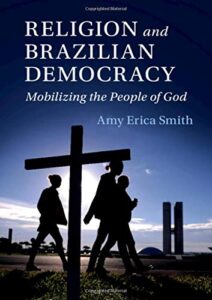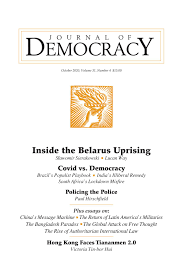 Covid-19 has had unambiguously tragic human consequences in Brazil, which have been exacerbated by President Jair Bolsonaro’s “executive underreach” in failing to follow public-health guidance, notes Amy Erica Smith, Amy Erica Smith, the author of Religion and Brazilian Democracy: Mobilizing the People of God (2019).
Covid-19 has had unambiguously tragic human consequences in Brazil, which have been exacerbated by President Jair Bolsonaro’s “executive underreach” in failing to follow public-health guidance, notes Amy Erica Smith, Amy Erica Smith, the author of Religion and Brazilian Democracy: Mobilizing the People of God (2019).
Yet the democratic impacts are mixed. On the one hand, the health crisis may have diminished the risk of military intervention, belying Bolsonaro’s expressed support for military insurrection and encouraging elites to resist his “performative golpismo.” On the other hand, the pandemic has furthered societal polarization and encouraged citizens to interpret even information on matters of immediate personal health through partisan filters. If the pandemic is a crucible, Brazil’s democracy will likely emerge brittle but intact, she writes in Covid vs. Democracy: Brazil’s Populist Playbook, an article in the latest issue of the NED’s Journal of Democracy:
 Brazil’s democracy remains at serious risk. One set of threats relates to democratic mechanisms for constraining and monitoring the executive. In treating the coronavirus as a public-relations problem, Bolsonaro has encouraged societal polarization, biased information processing, and motivated reasoning even as regards matters of life and death. Ultimately, these biased processes could inhibit horizontal accountability. Moreover, the history of the last decade suggests that impeachment is far from a straightforward mechanism for ensuring vertical accountability. In sum, although coups appear increasingly unlikely and the pandemic has not hurt the electoral process, covid-19 may erode democratic quality. RTWT
Brazil’s democracy remains at serious risk. One set of threats relates to democratic mechanisms for constraining and monitoring the executive. In treating the coronavirus as a public-relations problem, Bolsonaro has encouraged societal polarization, biased information processing, and motivated reasoning even as regards matters of life and death. Ultimately, these biased processes could inhibit horizontal accountability. Moreover, the history of the last decade suggests that impeachment is far from a straightforward mechanism for ensuring vertical accountability. In sum, although coups appear increasingly unlikely and the pandemic has not hurt the electoral process, covid-19 may erode democratic quality. RTWT
In her timely, data-rich study, Smith attributes the reactionary backlash in Brazil and elsewhere in Latin America to the emergence of issues that trigger fear among evangelicals: gay and transgender rights, sex and gender education in public schools, and abortion. In Smith’s view, the ultimate impact of the rise of evangelicals remains to be seen, Richard Feinberg wrote for Foreign Affairs:
- On the one hand, an intolerant dualism—dividing the world into sinners and the faithful—would threaten democratic norms.
- On the other hand, Smith suggests a more hopeful outcome if clergy and their congregants enter electoral politics and have their beliefs moderated by involvement in democratic practices. RTWT







